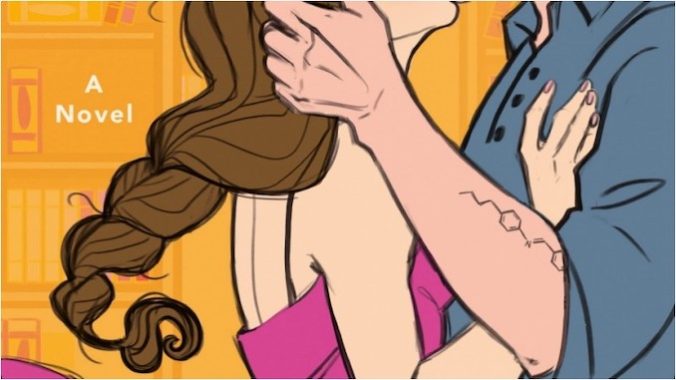Love, Theoretically Is Ali Hazelwood’s Nerdiest (and Best) STEM Romance Yet

Even if you don’t consider yourself a regular romance reader, you’ve probably heard of Ali Hazelwood. Bestselling author and BookTok sensation, her STEMinist romances are love stories that unabashedly center ultra-brainy female characters from diverse, often nontraditional backgrounds who excel in traditionally male academic fields like chemistry, neuroscience, physics, or engineering. (You know, exactly the kind of girl we’re always told by way too much of our popular culture that guys won’t like because they’re too smart and overprepared.)
Love, Theoretically is Hazelwood’s third novel, following her runaway hits The Love Hypothesis and Love on the Brain. And, at this point, it’s probably fair for some readers to ask: Does Hazelwood still have fresh things to say in this subgenre? At what point do these sorts of settings and characters become repetitive for her as an author? Is this book just another version of The Love Hypothesis with the character names swapped out? The answers to these questions may surprise many. Yes, Hazelwood’s romances have a clearly established formula to them, and that will either work for you or it won’t. But as a novel, Love Theoretically is more introspective and even nerdier than its predecessors, and as deliberately focused on its heroine’s interior emotional journey as it is her love life.
The story follows Elsie Hannaway, a talented theoretical physicist who has a Ph.D. but still struggles to get by, juggling three adjunct roles at various Boston area colleges and working for a company called Faux on the side. Faux is an app that connects single clients with pretend romantic partners for social events, family get-togethers, or other public-facing activities where it looks better if they have a girlfriend. (Whether that girlfriend is real or not.) It’s easy money and a perfect fit for her people-pleaser personality, which has always allowed her to easily suss out which version of herself those around her would most like to see.
But when she lands an interview for her dream job at MIT, her worlds collide: The brother of her most recent fake dating client, whom she only knew as Jack Smith, is actually Dr. Jonathan Smith-Turner, a hotshot young physicist whose scientific views are the polar opposite of her own. (And who now thinks she’s lied about her entire life to his brother.) The rivals to something more relationship that sparks between the two is a delight to watch unfold, full of plenty of snappy banter, mixed signals, and communications misfires. Her interactions with Jack force Elsie to reevaluate some of her preconceived notions about both herself and the professional world she exists in, from the all too fallible nature of the mentor she’s long-idolized, to the unconscious biases she must constantly navigate as a woman in her field.
There are really two major plotlines in one at work within Love, Theoretically, one is an exploration of the challenges facing women in Elsie’s position throughout academia, forced to figure out a way to pay for her insulin without health insurance while hoping to be chosen as a token hire meant to burnish some male-heavy department’s feminist and/or diversity-related bona fides. (With maybe a little research instead of grading student papers and answering emails about why they missed class on the side.) The second, and perhaps more important, thread is about Elsie’s specific struggles to accept herself —- to realize that she doesn’t need to play a role to make those around her like her, that she can allow the people in her life to truly see her for who she is, and that she doesn’t have to pretend to be someone she isn’t in order to get people to say. As she slowly learns to be honest with those around her and to ask for what she needs instead of what she thinks others might be occasionally willing to give, Elsie becomes a much more intriguing and three-dimensional character. (Though we are just…not going to agree about the Twilight films.)
-

-

-

-

-

-

-

-

-

-

-

-

-

-

-

-

-

-

-

-

-

-

-

-

-

-

-

-

-

-

-

-

-

-

-

-

-

-

-

-








































